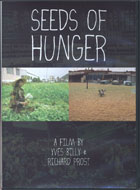
Seeds of Hunger 2008
Distributed by Icarus Films, 32 Court St., 21st Floor, Brooklyn, NY 11201; 800-876-1710
Produced by Yves Billy
Directed by Yves Billy and Richard Prost
DVD, color, 52 min.
Sr. High - General Adult
Agriculture, African Studies. Asian Studies, Economics, International Relations, South American Studies
Date Entered: 01/31/2011
Reviewed by Michael J. Coffta, Business Librarian, Bloomsburg University of PennsylvaniaSeeds of Hunger gives a phenomenal and unrelenting scrutiny of the economic impacts of food shortages, commodity prices, and trade policies. It quickly moves from examples of international organizations’ failures to adequately address problems related to food prices and production, to micro-examples of the plights of small farmers throughout the world. This encompassing documentary deals with economic, political, environmental and social aspects of the disordered world food markets. The film pays particular attention to China and Africa. China’s present and forecasted demands from its population growth and consumer lifestyle have had dramatic global consequences.
The film does an outstanding job in detailing the ‘falling dominoes” of such stresses. For example, China has decreased its soy production in favor of domestic production of wheat and swine. The Argentine government then instituted tax policies favoring the production of soy to fill this vacuum. While the favorable market for soy undoubtedly aided Argentina’s ability to pay debt and recover from its economic downturn in 2001, the rapid change of mandated farming techniques and land usage caused Argentine farmers to revolt.
This film captivatingly treats topics of urban migration, water depletion, commodity price fluctuations, and issues of land ownership. It uses compelling data and forecasts throughout. For example, a one degree increase in average annual temperature in Sub-Saharan Africa will cause a decrease of approximately 10% of grain harvest. This outstanding work also skillfully and consistently shows multiple outcomes of a phenomenon. For example, in 2007, the US shifted corn production for ethanol use, and therefore did not export nearly enough corn to Mexico, resulting in a 50% increase in corn prices. This lead to a series of riots later deemed the “Tortilla Crisis.” While production of biofuels may seem environmentally considerate on the surface, this film deeply explores the environmental impacts, and impacts on world hunger owed to biofuel production and even the vegetarian lifestyle. Seeds of Hunger concludes with a call for an international food policy (as opposed to an agricultural policy) or a policy that recognized and manages the interdependence of crop and livestock production and trade. Without such quick actions, the makers of this film declare that a global food crisis is imminent.
This is simply an outstanding documentary. It will appeal to a wide number of audiences, as it addresses concerns from numerous angles, and not just the economic angle. It is tightly woven and convincing. This brilliant and informative work is highly recommended to all in need of an extraordinarily in-depth examination of food production.